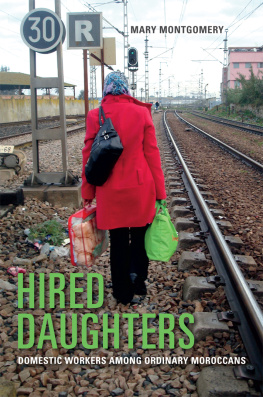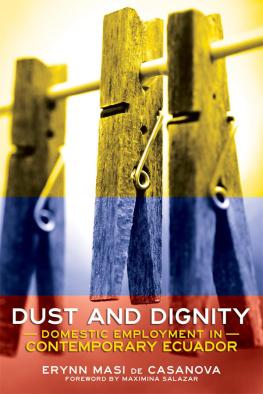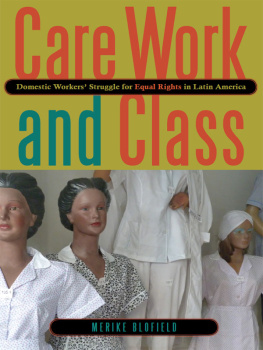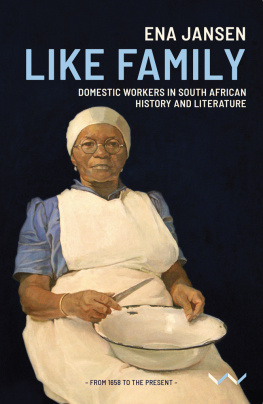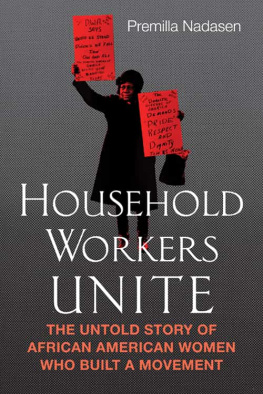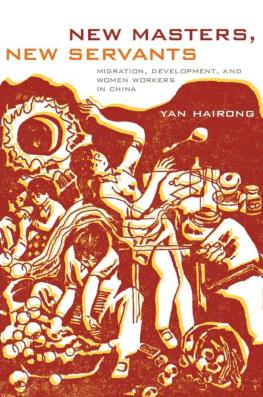Table of Contents
Guide
V ERY GREAT THANKS ARE DUE TO MY MOROCCAN friends and hosts for their trust, hospitality, and willingness to engage in the research that resulted in this book. It is dedicated to Fatima, whose story, told among the pots and pans of her employers kitchen over a decade ago, planted the seed from which the whole project grew. I am also much indebted to the El-Louisa family, whose house in Marrakech has long been a home away from home for me, and especially to Amal for teaching me Moroccan Arabic.
The book owes a great deal to my parentsand this on top of a personal debt: thank you for patiently reading multiple application forms, book proposals, and chapter drafts and for relentlessly encouraging me through every step of the process. Thank you for the many hours spent listening and praying over Skype and in person and for taking us children on holiday to Morocco all those years ago.
My anthropological heritage comes from Paul Dresch, whom I count it an immense privilege to know. I am so grateful for his thorough supervision, careful reading of drafts, and ability to get to the heart of the matter through my many words. My thanks also go to Judith Scheele for discussing ideas, reading my work, and inspiring me to study anthropology in the first place. Walter Armbrust had a hand in this too, and I still refer to his excellent reading list on the society and culture of the Middle East.
Writing can be a lonely business, but this was not my experience. I would like to thank the Magdalen College librarians for brightening my days and tirelessly ordering obscure books and Garance Auboyneau for her friendship and sense of humor in and out of the library. My thanks also go to Imogen Clark and other fellow students at ISCA for their solidarity and frank discussions, to Ammara Maqsood for treading the path ahead of me and passing on her wisdom, and to Ellie Reeve for the honest lunchtime conversations. I could not have weathered the ups and downs of academic life without steadfast friends like these.
The field is notoriously an even more solitary place than the library, but I am grateful that I did not find myself alone. Big thank-yous go to the Wallis family for welcoming me to Rabat and including me in their lives and to May Ngo, Eva Jakob, Eun-Jung An, and Caroline Kirby for their companionship and sharing of experiences in the field. I am equally grateful to my sister, Sarah, who visited me with a suitcase full of muesli and the rest of the time dispensed care and advice remotely, and to my brother Stephen, whose arrival on the scene turned a visa trip to Spain into a proper holiday. Stephen also edited my photosthank you!
Thanks to Wafa for kindly helping me understand the legal texts, to Najat Sedki for clarifying some important details after I left the field, and to Suriyah Bi for making pertinent suggestions for reading. Alison Shaw and Zuzanna Olszewska read and commented helpfully on portions of my thesis, as did Morgan Clarke, Bob Parkin, and Judith Scheele for a paper written in preparation for the field. I am also grateful for the detailed attention Elizabeth Ewart and Carolyn Steedman paid to examining my thesis and for their suggestions for publication. At a later stage I learned a lot from Andrew Shryocks generous engagement with my work. Ideas suggested by anonymous reviewers of a journal article, as yet unpublished, have also found their way into this book.
I would like to thank my colleagues and students at the London School of Economics for being a memorable part of my anthropology story and for encouraging and inspiring me while I worked on this project. Particular thanks go to Catherine Allerton and Katy Gardner, who mentored me, and to Rita Astuti, whose office, alive with foliage, provided a peaceful writing space during my two years there. Alice Tilche, Ryan Davey, Anni Kajanus, and Geoffrey Hughes read portions of my work and helped shape ideas for the book.
I am very grateful to the two anonymous reviewers who read my manuscript and whose insightful comments and suggestions gave me renewed energy, drew out many interesting connections I had missed, and helped make the book more readable. I worked on these revisions during a summer at the University of Helsinki, and I am grateful to Phaedra Douzina-Bakalaki, Carl Rommel, Suvi Rautio, and Sarah Green for their support during that time.
The Senior Mackinnon Scholarship from Magdalen College funded the three years of doctoral research on which this book is based as well as my MSc, during which I began to read around the topic of domestic service. The Anthropology Department at the London School of Economics financially supported my three-month return visit to the field in the summer of 2016. The Centre Jacques Berque provided a workspace in Rabat and connected me with other researchers.
Beyond particular times and places, a number of incredible people gave me courage and much-needed perspective while I worked on the book: Frith Ellingham, Pip King, Trish Sullivan, Lois Fulton, Grace Le, Sarah Ong, Fiona Gliddon, Ollie Ogunlade, Sarah German, my brother Peter, the other Mary Montgomery, Lauren and James Melachrino, and Steve and Viv Batemanthank you.
Finally, my sincere thanks go to Jennika Baines, Kate Schramm, David Miller, Julia Turner, and everyone at Indiana University Press who helped make this book a reality.
M. M.
MARY MONTGOMERY gained her doctorate in social anthropology from the University of Oxford in 2015. She went on to hold a fellowship at the London School of Economics before becoming a teacher of modern foreign languages.
T HE FIRST THING PEOPLE ASK WHEN YOU VISIT them in Rabat is, When are you leaving? This was said by a Moroccan from a town six hours drive south of Rabat, Ouarzazate, where the stereotype is that people in the capital are so busy making ends meet that they have little time for hospitality. Rabats identity as an administrative city makes for a work-oriented way of life, supposedly different from that of Marrakech or Fes. If cuisine is any indication of the time people have, the processing of cucumbers and tomatoes for the most basic Moroccan salad is illustrative: chopped very finely in Marrakech, they are left chunky in Rabat. A Ribs time is dear.
This suggests one would find a demand for cheap labor to help maintain standards of domesticity in the homes of busy, double-income families. But space is also dear in Rabat. High real estate prices mean homes are smaller than those of people with similar incomes elsewhere in Moroccoa limiting factor in the employment of live-in domestic workers if not of casual help. A mother of two who had grown up with a live-in domestic in a large house in Casablanca thus swept her hand around her Rabat apartment, saying, Im sorry, but if I want to employ [jb, literally bring] a worker, where is she going to sleep? Theres my room, theres the childrens room, theres the salon. Im not the kind who makes them sleep in the kitchen. Accommodating a domestic worker in the kitchen was not uncommon in less wealthy families in the past (Khelladi 1938, 266), and some workers I met had memories of struggling to sleep with the noise of the refrigerator. Even today, proximity to the kitchen is deemed appropriate, and modern apartments in the affluent Hay Riad area have small chambres de bonne (maids rooms) off the kitchen.
But compared with a large Hay Riad property, much less labor is needed to keep one of quartier de lOcans typically small apartments clean. Indeed, some women affirmed that their homes were so small there was little to do. Nonetheless, other families employed live-in domestic workers despite lack of room, indicating that to have a kh eddma (paid worker or servant) outweighed for them the inconvenience of an extra body in a small house. My fieldwork took me to this kind of employer: hardworking lower-middle-class families living in small apartments with domestics whom they called their daughters. While government statistics are unavailable and numbers are difficult to establish without access to every home, about one in ten households on my street had a live-in worker; many more had casual help.
Next page
